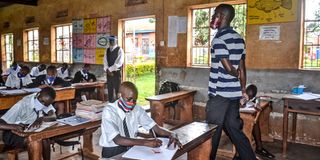High Covid cases delay reopening of schools

Candidates at Main Street Primary School attend class on November 17. Government also says its trying to develop mechanisms that can ensure continuity of learning amid Covid-19. PHOTO/DENIS EDEMA
What you need to know:
The Education ministry says it will continue distributing learning materials to pupils in rural areas.
More than 13.5 million learners who have spent eight months at home without studying due to Covid-19 pandemic that led to closure of schools may wait much longer after government said it is not ready to reopen schools for other classes.
Government in October reopened schools and institutions of learning for candidates and finalists at university and other tertiary educational institutions.
The Minister of State for Higher Education, Mr John Chrysostom Muyingo, yesterday during an interactive session with journalists after the Education Sector review conference, said given the increasing number of community infections where most learners come from, government has to be cautious on reopening schools for other classes.
“We want to send back our children to schools when we know they will be safe because if anything happens to them, it comes back to us. We do not want to rush to reopen just for the sake of reopening,” Mr Muyingo said.
“The inspection teams we sent to the field are still establishing how heads of schools are managing Covid-19 cases with the few numbers of students they have. If the outcomes are positive, we shall seek guidance from science experts before we determine which classes to reopen,” he added.
Way forward
Mr Muyingo said the ministry will print study material for learners who are at home as soon as the Ministry of Finance releases the required funds.
“The plans to have lessons delivered electronically to learners using radios was made impossible by Parliament that declined to approve the budget for purchase of radios. We have now gone back to the drawing board to ensure that printed materials are delivered to learners in rural areas,” he said.
Mr Muyingo’s comments come a few days after the Ministry of Health reported a spike in Covid-19 infections in communities.
Last week, sources at the Ministry of Education revealed that the ministry was planning to have sub-candidate classes ( Primary Six, Senior Three and Senior Five) join the candidates when they report in January for their final term but Mr Muyingo said they are still considering the plan.
Meanwhile, Uganda National Examinations Board (Uneb) yesterday revealed that it has registered more than 1.1 million candidates who to sit national examinations next year.
Exams for students in higher institutions are underway while candidate classes (primary seven, senior four and senior six) will sit their final exams by April next year.
According to a December 8 statement from the Uneb Executive Secretary, Mr Daniel Odongo, the examinations body registered 1,181,666 candidates for all the three levels of exams which is an increase of 3.8 per compared with 1,138,000 candidates registered in 2019. The registration deadline was Monday this week.
Mr Odongo asked school heads to display the draft registers and albums to enable candidates verify their data.
He also appealed to parents to check online the registration status of their children ahead of the final exams that will kick off on March 1, 2021.
He, however, noted that more girls (52 per cent) have been registered to sit Primary Leaving Examinations (PLE) compared with 48 per cent boys despite the high rates of teenage pregnancies that were reported during Covid-19 lockdown.
At Uganda Certificate of Education (UCE) level, 50.3 per cent of girls have been registered compared with 49.7 per cent boys.




